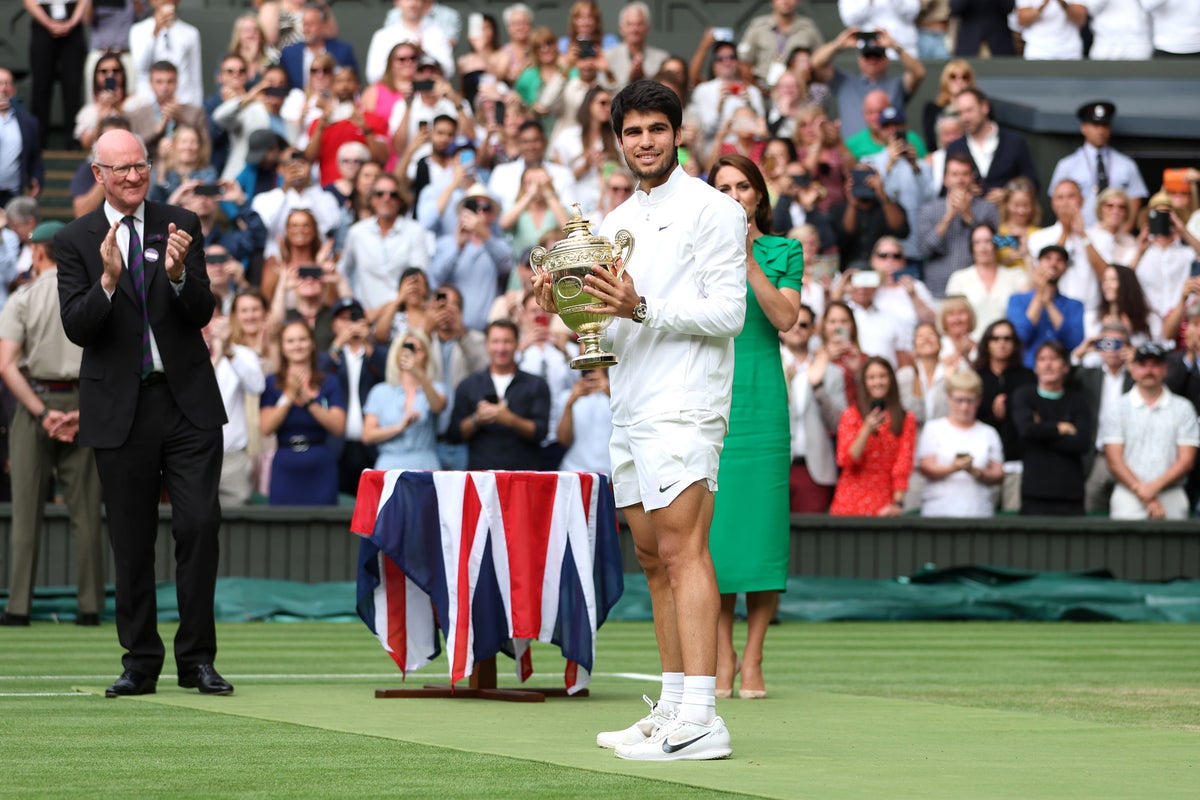
Wimbledon is over for another year and as usual it was an eventful fortnight.
There is a new king of Centre Court after Carlos Alcaraz dethroned Novak Djokovic while history was made in the women’s final as unseeded Marketa Vondrousova won.
Here, the PA news agency picks out five things we learned at the championships.
Djokovic proves mortal as Alcaraz reigns
There was a men’s final for the ages as long-time ruler Novak Djokovic, who had gone 10 years unbeaten on Centre Court, came up against the heir to the throne in the shape of Carlos Alcaraz.
Well, the Spaniard proved that he is ready to take the crown now as he won a near-five-hour final in five sets to claim a first Wimbledon title and deny his opponent a record-equalling eighth.
This is the start of a rivalry that will last as long as Djokovic carries on playing and it is fascinating to see how the 36-year-old reacts to his first SW19 defeat since 2017.
Wimbledon welcomes back Russian and Belarusian players
Russian and Belarusian players returned to Wimbledon following last year’s ban due to the invasion of Ukraine and were generally well received.
Men’s world number three Daniil Medvedev and women’s world number two Aryna Sabalenka made up for lost time by each reaching the semi-finals.
While political tensions remained relatively muted, there was a flash point when Victoria Azarenka of Belarus was jeered off court following her fourth-round defeat by Ukrainian Elina Svitolina.
Azarenka, who put up her hand to acknowledge Svitolina knowing her opponent did not wish to shake hands with a player from the aggressor countries, branded fans “drunk” and unfair.
Curfew causes issues
The All England Club’s insistence on beginning Centre Court matches at 1.30pm remains a source of frustration for some.
Djokovic led calls to overhaul the scheduling after his match with Hubert Hurkacz had to be suspended overnight due to the council-imposed 11pm curfew, while Andy Murray’s clash with Stefanos Tsitsipas was also impacted.
Despite objections, Wimbledon chief executive Sally Bolton offered no guarantees that earlier starts will be considered for next year’s tournament.
Beginning matches later makes the final contest of the day a prime-time occasion on BBC television and it appears that is now the goal, with Bolton reporting record viewing figures.
Britons fail to shine on big stage
Question marks hang over the state of British tennis after home interest in the adult singles draws was wiped out before the end of week one.
Women’s number one Katie Boulter was the last Briton standing but her hopes were emphatically ended by a thumping third-round defeat to defending champion Elena Rybakina on day six.
Two-time winner Murray, men’s number one Cameron Norrie and Liam Broady had all crashed out the previous day, while the raft of wild cards failed to produce a surprise package.
On a more positive note, 2021 US Open champion Emma Raducanu and potential star Jack Draper should soon return after missing the Championships through injury while 17-year-old Henry Searle became the first British boys’ singles champion at Wimbledon since 1962 and 14-year-old Mark Ceban won the boys’ under-14 event.
‘Big three’ dominance broken
For the first time since Ashleigh Barty won the 2022 Australian Open and subsequently retired, there was a grand slam champion from outside the so-called ‘big three’ of the women’s game.
Three-time major winner Iga Swiatek has been the dominant force post-Barty, while Sabalenka and Rybakina have each won one of the leading tournaments in that time.
But Sabalenka’s semi-final exit to Ons Jabeur, which prevented her from replacing Swiatek as world number one, signalled an end to the trio’s stranglehold on the slams.
World number 42 Vondrousova was the surprise new name on the trophy, becoming the first unseeded player to win the women’s tournament in her first significant grand slam run since she lost the 2019 French Open to Barty as a teenager.







